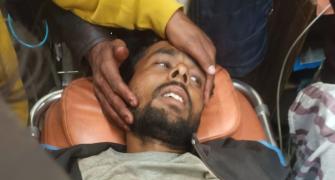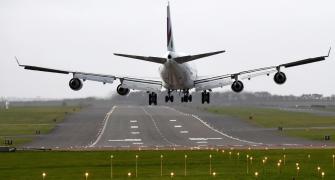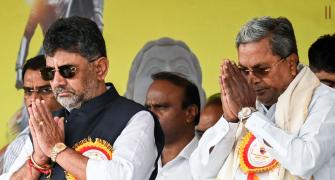Politicians' silence stuns men in uniform,' says the second lead story in The Hindu today.
The report is about the shocking insensitivity of the political class in Jammu & Kashmir and in New Delhi in failing to express their solidarity with over 30 members of our Border Security Force and their families, who were killed by Pakistan-sponsored terrorists through an improvised explosive device on the Jammu-Srinagar highway on May 23.
True, a statement on behalf of the new Council of Ministers headed by Dr Manmohan Singh condemning the incident and conveying condolences to the bereaved was issued immediately after the incident. The prime minister himself did not find the time to talk to the media about it. The statement was read out on his behalf by the principal information officer of the Government of India.
How does one express the nation's solidarity with the martyrs of the security forces on such occasions? By visiting the spot of the tragedy, by placing wreaths, by attending the cremation of those killed, by visiting the injured in hospital etc. None of these simple gestures occurred to any member of the political class as necessary, either in Srinagar or in New Delhi.
The over 30 martyrs of the BSF left this world, unwept, unsung, unhonoured by the political class. As one read with shock and disbelief the report in The Hindu, one's mind went back to January 10, 1990. On that day, Gobind Ram, a 45-year-old officer of the Indian Police Service, who was working as the commandant of the 75th battalion of the Punjab Armed Police in Jalandhar cantonment, and four other junior police officers were killed by an improvised explosive device planted by Sikh terrorists in the cooler of his office.
Gobind Ram was an exceptionally brave police officer who distinguished himself in the campaign against terrorism in Punjab. He and members of his family figured on the top of the so-called hit-list prepared by the terrorists. A few weeks before his assassination, the terrorists had killed his young son as he was returning home from school. Gobind Ram could have gone on long leave or asked for a transfer outside Punjab because of the threat faced by him and the other members of his family.
He did not do so.He chose to stay at his post of duty and continue to lead his men in their fight against terrorism. Ultimately, he paid with his life as he knew he would.
Gobind Ram was not the only brave officer of the Punjab police to have sacrificed his life in the fight against terrorism. There were 1,700 others of various ranks who met a similar brave death. One can find details of them in the Martyrs Gallery of the Punjab Police.
Please do visit the gallery and spare a thought for those martyrs, but for whose sacrifice the nation would not have peace in Punjab today.The list does not include the names of dozens of relatives of Punjab Police officers who were gunned down by the terrorists or killed with IEDs -- just as they killed Gobind Ram's young son.
Remember the day in August 1992, when the Punjab Police killed Sukhdev Singh Babbar, the notorious leader of the Babbar Khalsa in an encounter? That night, in a frenzy of retaliatory attacks, the terrorists killed the relatives of many special police officers and other personnel of the Punjab Police all over the state. One apprehended that the deaths of the relatives could demoralise the Punjab Police and weaken their fight against terrorism.
It didn't. They fought the terrorists with redoubled determination and ultimately prevailed.
When there were so many hundreds of brave martyrs, why am I mentioning the name of only Gobind Ram? What has his death got to do with deaths of the BSF personnel and their families in Jammu and Kashmir on May 23?
When Gobind Ram was killed, another coalition government headed by V P Singh had assumed office in New Delhi a few weeks earlier. V P Singh thought he would be able to bring peace to Punjab by opening up lines of communication with the terrorists through Simranjit Singh Mann. He feared that openly honouring Gobind Ram might damage his relationship with Mann.
He chose to let Gobind Ram leave the world unwept, unsung, unhonoured by him or his Council of Ministers. He did address a private letter of condolence to his widow, but consciously refrained from any public gesture of solidarity with the Punjab Police and members of Gobind Ram's family lest such gesture damage his lines of communications with Mann.
By consciously failing to honour in public the memory of a brave officer, did he achieve peace in Punjab? No.Terrorism worsened during his term in office.
It goes to the credit of the Punjab Police that they did not allow this shocking insensitivity by the political class to affect their morale and determination to fight the terrorists.
Remember another similar incident during V P Singh's prime ministership? The coalition led by him, which had been strongly critical of the Rajiv Gandhi government for sending the Indian Peace Keeping Force to Sri Lanka, decided to withdraw it from Sri Lanka.
Over 1,000 brave officers of our army had fallen martyrs in the operations against the LTTE. When the returning contingents landed in Chennai, the DMK government headed by M Karunanidhi chose to dissociate itself from the welcoming ceremony and refrained from any public or even private gesture honouring the memories of the brave jawans and officers who laid their lives in the fight against the most dreaded terrorist organisation in the world.
The DMK then supported the V P Singh government. Its sensitivities were more important to him than the sensitivities of the families of hundreds of Indian armymen killed by the LTTE.
More officers and men of the security forces have died in counter-terrorism operations in India than in any other country of the world. Nearly 10,000 men. Refraining from demonstrating public gestures of honour to the memories of our martyrs out of partisan political considerations is not the way to win our campaign against terrorism.







